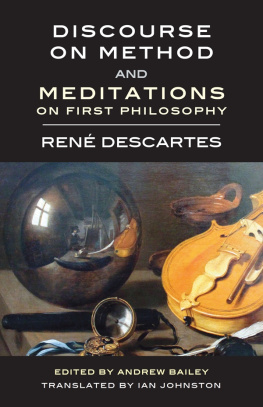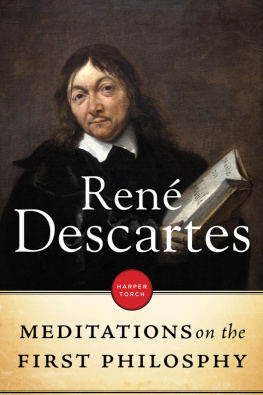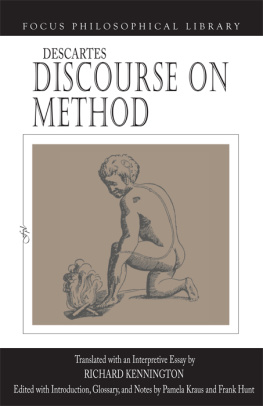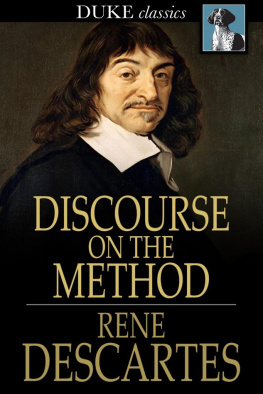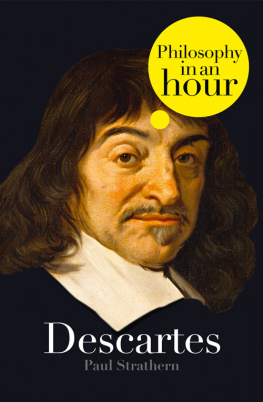René Descartes - Discourse on Method and Meditations on First Philosophy
Here you can read online René Descartes - Discourse on Method and Meditations on First Philosophy full text of the book (entire story) in english for free. Download pdf and epub, get meaning, cover and reviews about this ebook. year: 2020, publisher: Broadview Press, genre: Science. Description of the work, (preface) as well as reviews are available. Best literature library LitArk.com created for fans of good reading and offers a wide selection of genres:
Romance novel
Science fiction
Adventure
Detective
Science
History
Home and family
Prose
Art
Politics
Computer
Non-fiction
Religion
Business
Children
Humor
Choose a favorite category and find really read worthwhile books. Enjoy immersion in the world of imagination, feel the emotions of the characters or learn something new for yourself, make an fascinating discovery.
- Book:Discourse on Method and Meditations on First Philosophy
- Author:
- Publisher:Broadview Press
- Genre:
- Year:2020
- Rating:5 / 5
- Favourites:Add to favourites
- Your mark:
- 100
- 1
- 2
- 3
- 4
- 5
Discourse on Method and Meditations on First Philosophy: summary, description and annotation
We offer to read an annotation, description, summary or preface (depends on what the author of the book "Discourse on Method and Meditations on First Philosophy" wrote himself). If you haven't found the necessary information about the book — write in the comments, we will try to find it.
Discourse on Method and Meditations on First Philosophy — read online for free the complete book (whole text) full work
Below is the text of the book, divided by pages. System saving the place of the last page read, allows you to conveniently read the book "Discourse on Method and Meditations on First Philosophy" online for free, without having to search again every time where you left off. Put a bookmark, and you can go to the page where you finished reading at any time.
Font size:
Interval:
Bookmark:
and
Meditations on First Philosophy
and
Meditations on
First Philosophy

BROADVIEW PRESS www.broadviewpress.com
Peterborough, Ontario, Canada
Founded in 1985, Broadview Press remains a wholly independent publishing house. Broadviews focus is on academic publishing; our titles are accessible to university and college students as well as scholars and general readers. With 800 titles in print, Broadview has become a leading international publisher in the humanities, with world-wide distribution. Broadview is committed to environmentally responsible publishing and fair business practices.
2020 Broadview Press
All rights reserved. No part of this book may be reproduced, kept in an information storage and retrieval system, or transmitted in any form or by any means, electronic or mechanical, including photocopying, recording, or otherwise, except as expressly permitted by the applicable copyright laws or through written permission from the publisher.
Library and Archives Canada Cataloguing in Publication
Title: Discourse on method and Meditations on first philosophy / Ren Descartes; edited and introduced by Andrew Bailey; translated by Ian Johnston.
Names: Descartes, Ren, 1596-1650, author. | Bailey, Andrew, 1969- editor. | Johnston, Ian (Ian Courtenay), 1938- translator. | Container of (expression): Descartes, Ren, 1596-1650. Discours de la mthode. English. | Container of (expression): Descartes, Ren, 1596-1650. Meditationes de prima philosophia. English.
Description: Translations of Discours de la mthode and Meditationes de prima philosophia. | Includes bibliographical references and index.
Identifiers: Canadiana (print) 20200285815 | Canadiana (ebook) 20200285955 | ISBN 9781554815548 (softcover) | ISBN 9781770487840 (PDF) | ISBN 9781460407356 (EPUB)
Subjects: LCSH: Methodology. | LCSH: Knowledge, Theory of. | LCSH: ScienceMethodology. | LCSH: First philosophy.
Classification: LCC B1848.E5 J64 2020 | DDC 194dc23
Broadview Press handles its own distribution in North America:
PO Box 1243, Peterborough, Ontario K9J 7H5, Canada
555 Riverwalk Parkway, Tonawanda, NY 14150, USA
Tel: (705) 743-8990; Fax: (705) 743-8353
email: customerservice@broadviewpress.com
For all territories outside of North America, distribution is handled by Eurospan Group.
Broadview Press acknowledges the financial support of the Government of Canada for our publishing activities.

Copy-edited by Robert M. Martin and Michel Pharand
Typeset by Eileen Eckert
Cover design by Lisa Brawn
PRINTED IN CANADA

Who Was Ren Descartes?
Ren Descartes was born in 1596 in a small town nestled below the vineyards of the Loire in western France; at that time the town was called La Haye, but it was later renamed Descartes in his honor. His early life was probably unhappy: he suffered from ill health, his mother died a year after he was born, and he didnt get on well with his father. (When Ren sent hisof Poitiers and studied mathematics and mechanics; then, at 21, he joined first the Dutch army of Prince Maurice of Nassau and then the forces of Maximilian of Bavaria. As a soldier he saw little action, traveling around Europe supported by his familys wealth.
During this period, he resolved
I came to see that the exclusive concern of mathematics is with questions of order or method, and that it is irrelevant whether the measure in question involves numbers, shapes, stars, sounds, or any other object whatsoever. This made me realize that there must be a general science which explains all the points that can be raised concerning order and measure irrespective of subject matter. (from Rules for the Direction of Our Native Intelligence [1628])
This insight led Descartes directly to one of the most significant intellectual innovations of the modern age: the conception of science as the exploration of abstract mathematical descriptions of the world.
It was also during this timein 1619that philosophical system to underpin all human knowledge.
In 1628, at the age of 32, Descartes settled in the Netherlands (at the time the most intellectually vibrant region of Europe), where he lived for most of his remaining life. It was only then that he began sustained work in metaphysics and mathematical physics. His family was wealthy enough that Descartes, who cultivated very modest tastes, and philosophical views, the Principles of Philosophy, which he hoped would become a standard university textbook, replacing the medieval texts used at the time. His last work, published in 1649, was The Passions of the Soul, which attempted to extend his scientific methodology to ethics and psychology.
Descartes never married, but in 1635 he had a daughter, Francine, with a serving woman called Hlne Jans. He made arrangements to care for and educate the girl but she died of scarlet fever at the age of five, a devastating shock for Descartes.
In 1649 Descartes accepted an invitation to visit Stockholm and give philosophical instruction to Queen Christina of Sweden. He was required to give tutorials at the royal palace at five oclock in the morning. Ever since he was a sickly schoolboy, he stayed in bed until 11 a.m., and it is said that the strain of this sudden break in his habits and the harsh Swedish winter caused him to catch pneumonia; he died in February 1650. His dying words are said to have been, mon me, il faut partirmy soul, its time we must leave. His body was returned to France but, apparently, his head was secretly kept in Sweden; in the 1820s a skull bearing the faded inscription Ren Descartes was discovered in Stockholm and is now on display in the Museum of Natural History in Paris.
What Was Descartess Overall Philosophical Project?
Descartes lived at a time when the accumulated beliefs of centuriesassumptions based on religious doctrine, straightforward observation, and common sensewere being gradually but remorselessly stripped away by exciting new discoveries. (The most striking example of this was the evidence mounting against the centuries-old belief that an unmoving Earth is the center of the universe, orbited by the moon, sun, stars, and all the other planets.) In this intellectual climate, Descartes became obsessed by the thought that no lasting scientific progress was possible without a systematic method for sifting through our preconceived assumptions and distinguishing between those that are reliable and those that are false. Descartess central intellectual goal was to develop just such a reliable scientific method, and then to construct a coherent and unified theory of the world and of humankinds place within it. This theory, he hoped, would replace scholasticism, the deeply flawed medieval system of thought based on the science of Aristotle and Christian theology.
Font size:
Interval:
Bookmark:
Similar books «Discourse on Method and Meditations on First Philosophy»
Look at similar books to Discourse on Method and Meditations on First Philosophy. We have selected literature similar in name and meaning in the hope of providing readers with more options to find new, interesting, not yet read works.
Discussion, reviews of the book Discourse on Method and Meditations on First Philosophy and just readers' own opinions. Leave your comments, write what you think about the work, its meaning or the main characters. Specify what exactly you liked and what you didn't like, and why you think so.

